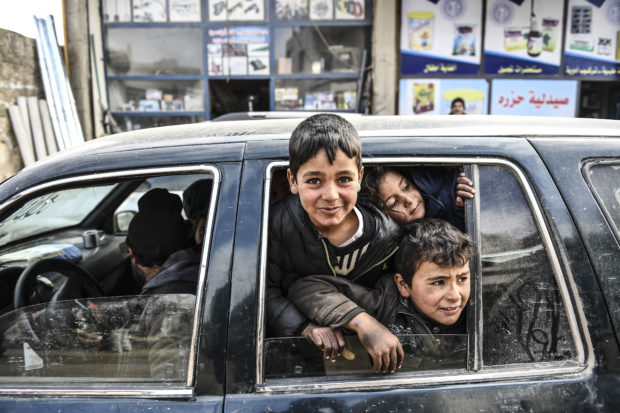ANKARA, Turkey — Talks between Russia and Turkey meant to reduce tensions in northwestern Syria did not yield a “satisfactory result” for Ankara, but both sides agreed to continue negotiations, a spokesman for Turkey’s president said Tuesday.

Civilians flee from Idlib toward the north to find safety inside Syria near the border with Turkey, Saturday, Feb. 15, 2020. Syrian troops are waging an offensive in the last rebel stronghold. (AP Photo)
Turkey and Russia support rival groups in the Syrian conflict and for the past few years have been closely coordinating their moves in Idlib province.
A truce reached between the two countries collapsed in late 2019, leading to an offensive by Russian-backed Syrian troops who captured wide areas in the last rebel stronghold and triggered one of the civil war’s worst humanitarian crises with about 900,000 people fleeing their homes.
A Turkish delegation ended two days of talks with Russian officials in Moscow, and Ibrahim Kalin, the spokesman for Turkish President Recep Tayyip Erdogan, said both sides agreed to meet again.
“We did not accept the document and map that was presented to us,” Kalin said, adding that Turkey’s position was for a return to the lines laid out under a cease-fire agreement for Idlib in 2018.
Briefing journalists after a Cabinet meeting, Kalin also said it was out of the question for Turkey to move the positions of its observation posts.
Turkey will continue sending in reinforcements “to protect the region and civilians,” Kalin said, adding that Ankara would respond to any attack against its troops “in the strongest way, like we did in the past weeks.”
The Russian Foreign Ministry said in a statement that “both sides noted their adherence to the existing agreements that envisage measures to reduce tensions, ease the humanitarian situation and continue the fight against terrorism.”
The end of the talks came hours after the U.N. human rights chief urged Syrian government forces and their allies to allow safe corridors in conflict areas in northwestern Syria, where a military offensive has unleashed a massive wave of fleeing civilians in one of the worst humanitarian catastrophes in the long civil war.
Michelle Bachelet told reporters in Geneva it was “cruel beyond belief” that civilians live under plastic sheeting in freezing conditions while getting bombed.
Her appeal came after a day after Syrian President Bashar Assad pledged to press ahead with a military campaign in the northwest that hasdisplaced many people from their homes since the start of December, according to U.N. officials.
Many of the civilians are sleeping in open fields and under trees in freezing temperatures.
“Children and families are caught between the violence, the biting cold, the lack of food and the desperate living conditions. Such abject disregard for the safety and well-being of children and families is beyond the pale and must not go on,” said Henrietta Ford, executive director of the U.N.’s children agency.
About half the region’s population had already fled other parts of Syria, and displacement refugee camps are full. Aid organizations, including the U.N. World Food Program, have been forced to stop food distribution temporarily because the fighting has disrupted the movement of trucks bringing supplies to the region.
Backed by Russian air power, Syrian government troops have made swift advances, seizing dozens of towns and villages in Idlib province and nearby rural areas around Aleppo.
In the past week, Assad’s forces have secured a strategic highway known as the M5 and consolidated control over Aleppo province for the first time since 2012, dealing a severe blow to the opposition now fighting to hold its last bastion in Idlib.
Turkey has restarted joint patrols with the Russian military in northeastern Syria after a two-week hiatus due to the escalation in Idlib, the Russian military said.
The government’s rapid advances have sparked rare clashes between Syria and Turkey, which backs Syria’s rebels and has troops in the region to monitor a 2018 cease-fire deal. Turkey’s president has warned Assad to halt the advance and sent thousands of troops and equipment into the opposition enclave to try to stall the Syrian government offensive.
Already home to more than 3.5 million Syrian refugees, Turkey fears a new influx of people may overwhelm its borders which it has kept sealed in recent years.
The resumption of joint patrols in Hassakeh, in eastern Syria, was a possible sign of easing tensions.
The U.N. Human Rights Office said it recorded 298 civilian deaths in Idlib and Aleppo, where the government offensive has been concentrated, since Jan. 1. It said 93 percent of those deaths were caused by the Syrian government and its allies. In addition, 10 medical facilities and 19 educational facilities were either directly hit or affected by nearby strikes, the U.N. office said.
U.N. Secretary-General Antonio Guterres decried suffering of Syrians as “horrible” in the 9-year-old civil war.
In an interview with The Associated Press in Lahore, Pakistan, Guterres called for an immediate cease-fire, urging Turkey, Russia and Iran to find a political solution.
Bachelet also urged all parties begin an immediate cease-fire and ensure the protection of all civilians. She called on the Syrian government and its allies to allow humanitarian corridors in conflict areas to permit the safe passage of civilians.
“No shelter is now safe,” Bachelet said. “And as the government offensive continues and people are forced into smaller and smaller pockets, I fear even more people will be killed.”
Syrian opposition activists, meanwhile, reported airstrikes on several rebel-held areas Tuesday, including the outskirts of the town of Atareb and Daret Azzeh.